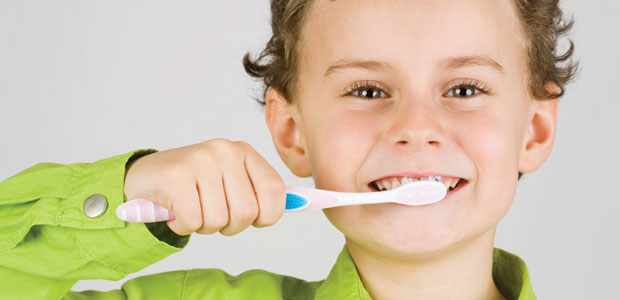Advertisement
Children’s Oral Health
Establish good habits early

Most parents would agree that the overall health and happiness of their child is paramount. However, it is easy to overlook how a child’s oral health can have an effect on many developmental, social, and psychological factors that contribute to overall well-being.
The consequences of poor oral hygiene
Poor oral health at a young age can have serious consequences. Imagine the pain and difficulty involved in eating with cavity-stricken teeth.
Poor nutrition caused by a child’s inability to properly chew and extract the maximum nutrients from food is often understated. Children who cannot properly chew their food tend to “gulp” their food, which dramatically affects weight gain and thus self-esteem. Again, the medical, social, and psychological effects of these problems are apparent.
Learning suffers due to lack of mental acuity and concentration, not to mention the negative psychological effect of not being able to keep up with the rest of the class. Children may become withdrawn. Consequently, their social experiences may be minimized.
When made aware of these possible outcomes, parents are often surprised by not only what could go wrong, but also how simple the prevention of these dental health issues can be.
The roots of healthy teeth
Although it may seem early, proper oral care starts during pregnancy. It’s important that your teeth are healthy while you are pregnant, as well as after the birth of your child, to avoid passing bacteria to your baby. Getting a thorough checkup from your dentist and ensuring your diet includes good sources of calcium and vitamin D are two excellent places to begin.
Oral care in infants begins before any teeth appear. Use a clean, soft cloth or gauze to wipe your baby’s gums and mouth twice daily beginning at birth. This not only clears food debris, but also gets them used to the act of oral care and makes introducing a toothbrush much easier once teeth are present.
Once the first tooth appears, use a soft baby toothbrush with toothpaste. Use only a tiny dab of toothpaste; by age three it should be no larger than the size of a pea.
Oral health tools
Although one hears many opinions on fluoride (see sidebar), a nonfluoridated toothpaste is the natural alternative to commercial fluoride toothpaste.
Flossing is very important for children. It will help to prevent cavities from starting between any teeth that are in contact with each other as well as introduce the process at a young age so children will be more likely to continue ?ossing in adulthood.
As long as it’s not impregnated with fluoride, any floss will work. Find a ?oss wide enough (the wider the better) that slides easily between your child’s teeth. Natural, fluoride-free toothpastes as well as natural floss are readily available at health food stores.
Maintaining good habits
As children grow and become more independent, maintaining good flossing and brushing habits will help to solidify the process of caring for their oral health. However, this independence can occasionally lead to arguments when older children become more difficult to educate.
Often, parents use threats and punishment to establish behavioural patterns of oral care. Statements like “If you don’t brush your teeth the dentist will have to give you a big needle and pull all your teeth” serve only to perpetuate the socially entrenched fear of the dentist. Making the dentist a figure of fear and negativity can lead to less frequent checkups in adulthood.
Instead, try praising and rewarding when a desired behaviour is introduced and make sure your child sees a dentist and/or hygienist early and on a regular basis. Hygienists are excellent at motivating even the most troublesome little ones.
Poor oral hygiene is a significant yet preventable problem. The key to prevention is education. Behaviour modification can be difficult but it is compounded in the young. Each child and every situation is different so don’t be afraid to ask your dental health practitioner for tips.
The pros and cons of fluoride
Fluoride use, and fluoride in drinking water in particular, is controversial. Studies indicate less cavity activity in communities that fluoridate the drinking water. However, the long-term detrimental effects, especially in bone metabolism and formation, of ingesting fluoride ions continue to be an issue of much debate.
Topical application in toothpastes and gels is effective and safer but should be instituted in close consultation with your dentist and susceptibility tests (saliva swab). Some children are at such a great risk that a topical fluoride varnish is provided.
Having your dentist assess your child’s susceptibility to cavities is important, as this can range significantly from child to child.
Foods for healthy teeth
Limiting sugary snacks and avoiding soft drinks are two important steps in preventing tooth decay, but nutrition’s role in promoting healthy teeth doesn’t stop there. Parents, when preparing healthy snacks and meals for your children, make note of these tips.
- Dairy products such as yogourt, cheese, and milk contain calcium necessary for healthy bones and teeth.
- Sugar can be disguised under many names, including glucose, fructose, and corn syrup.
- Snacking is important for children who are growing and developing, so don’t cut out snacks between meals entirely. Instead, choose healthy snacks with less sugar.
- Tooth-friendly snacks include nuts and seeds, vegetables, and whole grains.
- When you do indulge in sweets, eat them at mealtimes when there is more saliva in the mouth to fight the sugar.
Choosing a toothpaste
Keep these ingredients in mind when selecting a natural toothpaste.
- Aloe vera helps to soothe and heal inflammation.
- Coenzyme Q10 has been suggested to protect gums and treat gum disease.
- Xylitol is a sugar alternative that may help to prevent cavities.
- Zinc citrate has been shown to reduce bacteria on teeth.
- Peppermint is a common flavouring agent that freshens breath naturally.




